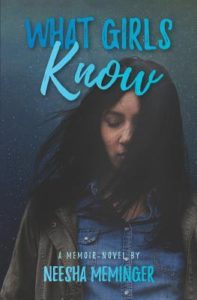 After debuting in 2009 with her award-winning YA novel Shine Coconut Moon, Neesha Meminger has continued to create powerful and varied books for teens that she has published independently. She began her indie career with Jazz in Love, a pioneering own voices rom-com featuring Indian-American characters. Her next novel, Into the Wise Dark, was a portal fantasy based on legends from her Sikh heritage with a feminist twist. Her latest work, What Girls Know, is an emotionally wrenching memoir in verse that chronicles her recovery from having been sexually abused at a Sikh Temple, a holy place where she should have been protected and safe. The experiences described here parallel those among many other religious groups; the scandals involving the Catholic Church are merely the ones with the most publicity. Everywhere else, silence continues to reign.
After debuting in 2009 with her award-winning YA novel Shine Coconut Moon, Neesha Meminger has continued to create powerful and varied books for teens that she has published independently. She began her indie career with Jazz in Love, a pioneering own voices rom-com featuring Indian-American characters. Her next novel, Into the Wise Dark, was a portal fantasy based on legends from her Sikh heritage with a feminist twist. Her latest work, What Girls Know, is an emotionally wrenching memoir in verse that chronicles her recovery from having been sexually abused at a Sikh Temple, a holy place where she should have been protected and safe. The experiences described here parallel those among many other religious groups; the scandals involving the Catholic Church are merely the ones with the most publicity. Everywhere else, silence continues to reign.
Anji’s earliest, and most comforting, memories are of the elderly woman who took care of her in India, before her father brought her, her mother, and her younger brother, Sanjit, to Canada. In this cold land, her parents worked all the time, leaving her and Sanjit at the Sikh Temple. They weren’t safe there, and they weren’t safe anywhere else in Canada, as shortly after their arrival, a racist gang torched their home. Years later, Anji is in high school and acting out, having sex and using drugs with a boyfriend who ends up in prison. She ends up in counseling along with classmate Toni and several other girls who’ve survived abuse. They write their stories, support each other, and mourn one of their own who disappears. Anji, though, is faced with unique struggles: what to tell her parents about the priest they trusted, her brother’s slide into delinquency, a boy she loves but to whom she cannot reveal herself.
Through memorable words and images, Meminger captures Anji’s seesawing emotions as well as her growth, hard won through her relationships with counselor Cathy, best friend Toni, and the other members of their tight-knit group. We see the struggles of South Asian immigrants to Canada who were not welcomed and who continue to struggle against stereotyping and discrimination, which contributes to efforts to silence Anji when she reveals dark secrets or wonders if she can remain in a home where she is still not seen and protected. Meminger addresses the abuse in Anji’s mother’s past, a generational pattern that Anji tries so hard to break. This is a story about finding and telling the truth, a powerful work published on its own terms. The truth will set us free.
1 comment for “Healing From Abuse Through Poetry: A Review of What Girls Know”